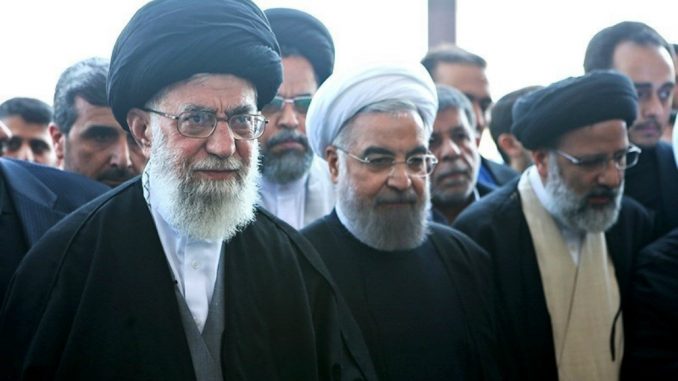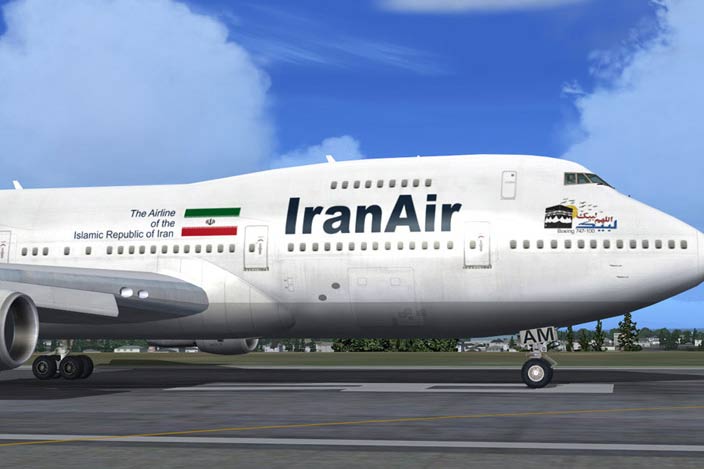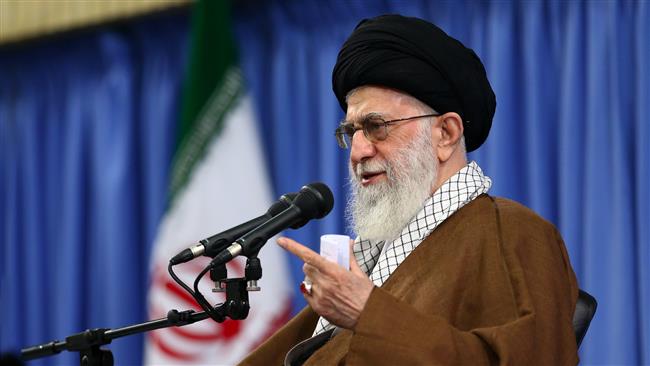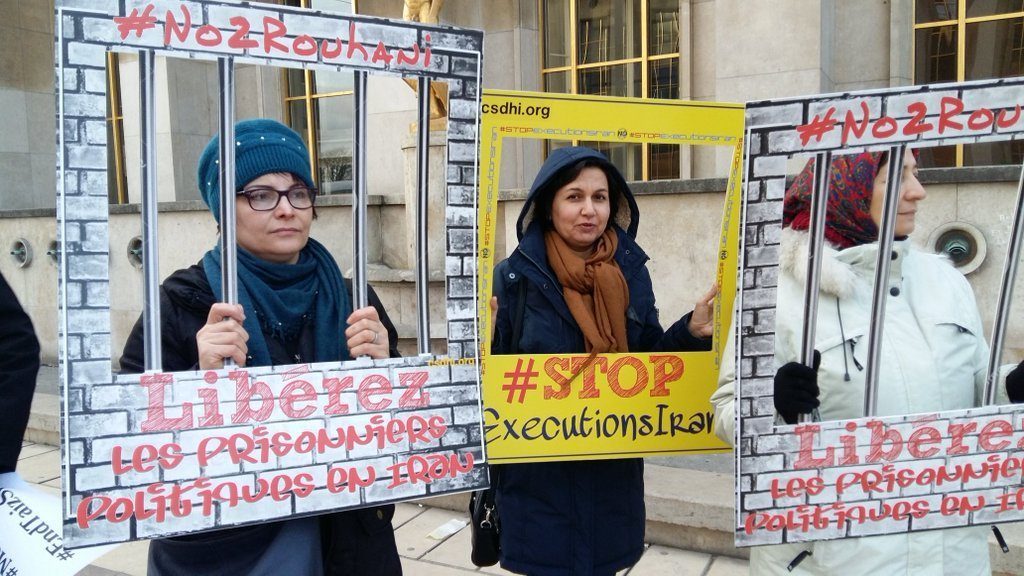
As Iran’s presidential election will be held on May 19, president Hassan Rouhani keeps receiving hard criticism despite the economic benefits he brought to Iran, what threatens his odds to run for a second term.
Iran made a historic nuclear deal with P5+1 powers in 2015, in which Tehran agreed to amend its nuclear output in order to lift all nuclear-related economic sanctions, freeing up tens of billions of dollars in oil revenue and frozen assets.
After lifting the sanctions, Iranian president Hassan Rouhani visited Europe and made deals that worth billions of dollars. European companies started looking for investment opportunities in the growing Iranian market.
The Iranian government also sought deals with western companies to develop and maintain its natural resources such as Oil and Gas.
In addition, Iran has made new trade relations with many European countries to widen the Iranian market and help in modernising the country’s infrastructure and its public transport.
Nevertheless, doubts have been cast on whether Hassan Rouhani will be capable of pulling off a victory. Will he be Iran’s first one-term president?
Running for a second presidential term
Rouhani is likely to run a campaign highlighting the economic benefits of the nuclear deal which opened Iran to international investment that had been lacking for years due to sanctions.
These achievements resemble a big victory for Hassan Rouhani, Iran’s centrist president, who has been questioned by critics at home about the limited economic dividends so far from last year’s agreement with major powers to kerb Tehran’s nuclear program.
In his New Year’s message, Rouhani touted the economic achievements of his government and called for citizens’ rights to be respected, points likely to resonate with his supporters in the approaching election.
“What we achieved in kerbing inflation (and boosting) economic growth and jobs in the past year was unprecedented in the past 25 years,” Rouhani said in a video message aired on state TV.
Rouhani also said the “security environment” in cultural and social affairs must be put aside.
In addition, Rouhani tries to criticise his opponents in return, seeking to gather a bigger social base from the middle-class Iranian around him.
“Soon it’s the (Iranian) New Year, so let the people have some joy,” Rouhani, who has advocated greater social freedoms, said in a speech carried live on state television in February.
Rouhani said also in the same speech that his government stood for opening Iran up to the outside world while his opponents sought confrontation and isolation.
“We are a government that says we should use foreign capital,” said Rouhani.
“We say if our aircraft fleet is in need of new planes we should buy them. But some say it’s honourable to use old equipment,” he said.
“We are steadfast in our principles and we don’t compromise on them, but we should talk to the world, engage and cooperate with it,” said Rouhani, rejecting accusations that his policies amounted to selling out the principles of Iran’s 1979 Islamic Revolution.
Hard criticism for Rouhani
Fingers are being pointed at Rouhani from almost every direction. The blame has also been attributed to the technocrat team he chose who are mainly western-educated politicians, including Iran’s foreign minister, Javad Zarif.
One group, in particular, is more empowered and feels fully vindicated in pointing towards Rouhani’s failures: the hardliners. The hardliners are mainly the judiciary system, the Revolutionary Guard Corps and its five forces, including the Quds Force and Basij, the Ministry of Intelligence, the Assembly of Experts and Ayatollah Ali Khamenei, the Supreme Leader.
Recently, Iran’s supreme leader rebuked Rouhani for failing to fulfil his promises on improving the economy. Khamenei stated: “We receive complaints from people. … People should feel improvements regarding creation of jobs and manufacturing. It is not the case now.”
The timing of Khamenei’s speech was intriguing as it came soon after the International Monetary Fund’s recently released report on Iran’s economy. The executive board of the IMF commended the Iranian authorities for “achieving an impressive recovery in economic growth after the lifting of nuclear sanctions in 2016..”
The senior cadre of the Revolutionary Guards has also become more unrestrained as they argue Rouhani’s agenda of rapprochement with the United States and the West has failed. Ayatollah Ahmad Jannati, the head of the assembly of experts that selects Iran’s supreme leader, lashed out at Rouhani’s failure to improve the economy as well.
Rouhani’s attempts to attract foreign investment on a large scale had not materialised. Khamenei rebuked Rouhani: “Attracting foreign investment is a positive measure but so far a very limited [number] of foreign contracts have materialised.”
America’s seemingly changing policy towards Iran is also not helping Rouhani. Former US national security adviser, Michael Flynn, put Iran “on notice” after Iran test-fired a ballistic missile in apparent violation of a UN resolution. Iran argued that its ballistic missile is for defence purposes. Later, Iran testfired a pair of missiles and launched military exercises in the Strait of Hormuz, where one-third of the global oil traded by sea passes through. Last week, US officials said that an Iranian frigate strayed dangerously close to a US navy ship.
Hardliners are capitalising on the heightened tensions between Iran and the US and hope to stop Rouhani from becoming president for another four years.
Most of Iran’s newspapers, which are owned by the hardliners, have also started a campaign to highlight Rouhani’s failures in domestic, foreign, and regional policies.
Classic tactics by Khamenei
It is worth noting that Khamenei is resorting to his classic tactic of wielding power while avoiding being held accountable at any cost. To accomplish his objective, Khamenei has always made sure that his presidents take the responsibility for economic or political failure. In addition, he has ensured that the president doesn’t wield any actual power.
Rouhani did bring billions of dollars of extra revenues to Iran. But, the major reason that many people did not see the fruit of sanction reliefs or foreign contracts is that the beneficiaries of this additional cash were mostly the elite. Business deals were sealed at state level. The money did not trickle down to the people.
In his New Year’s message, Khamenei renewed his hard criticism for Rouhani’s policy, using his tactics once again perfectly.
“I feel the pain of the poor and lower class people with my soul, especially because of high prices, unemployment and inequalities,” Khamenei said.
“The government has taken positive steps but they do not meet people’s expectations and mine,” he added, setting out a clear battle line before the presidential vote.
Unemployment stood at 12.4 percent in this fiscal year, according to the Statistical Center of Iran, up 1.4 percent from the previous year. About 3.2 million Iranians are jobless, out of a total population of 80 million.
“I call the new year a year of resistance economy, production and employment,” Khamenei said in the pre-recorded video broadcast on state television.
Khamenei has coined the term “resistance economy” to describe measures to make Iran’s economy more self-sufficient, in contrast to Rouhani’s policy of seeking to open Iran to more international trade and investment.
The starkly different messages from the supreme leader and the president could polarize voters ahead of the presidential election.
The New Year, or Nowruz, is the nation’s most important holiday. It marks the start of spring and is usually celebrated on 21 March, the previous day or the following day in a tradition that has lasted thousands of years.



